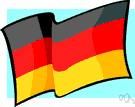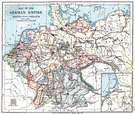German
(redirected from Germans)Also found in: Thesaurus, Legal, Idioms, Encyclopedia, Wikipedia.
Ger·man
(jûr′mən)adj.
1. Of, relating to, or characteristic of Germany or its people.
2. Of or relating to the German language.
n.
1.
a. A native or inhabitant of Germany.
b. A person of German ancestry.
2. Any of the West Germanic languages and dialects spoken or originating in Germany, Austria, or Switzerland, especially standard High German.
[Middle English, from Latin Germānus.]
ger·man 1
(jûr′mən)n. Regional
1. An intricate dance for many couples.
2. A party for dancing at which this dance is featured.
[Short for German cotillion.]
ger·man 2
(jûr′mən)adj.
Having the same parents or the same grandparents on either the mother's or the father's side. Often used in combination: a cousin-german; a brother-german.
[Middle English germain, from Old French, from Latin germānus, from germen, offshoot; see genə- in Indo-European roots.]
American Heritage® Dictionary of the English Language, Fifth Edition. Copyright © 2016 by Houghton Mifflin Harcourt Publishing Company. Published by Houghton Mifflin Harcourt Publishing Company. All rights reserved.
german
(ˈdʒɜːmən)n
(Dancing) US a dance consisting of complicated figures and changes of partners
[C19: shortened from German cotillion]
german
(ˈdʒɜːmən)adj
1. (Genetics) (used in combination)
a. having the same parents as oneself: a brother-german.
b. having a parent that is a brother or sister of either of one's own parents: cousin-german.
2. a less common word for germane
[C14: via Old French germain, from Latin germānus of the same race, from germen sprout, offshoot]
German
(ˈdʒɜːmən)n
1. (Languages) the official language of Germany and Austria and one of the official languages of Switzerland; the native language of approximately 100 million people. It is an Indo-European language belonging to the West Germanic branch, closely related to English and Dutch. There is considerable diversity of dialects; modern standard German is a development of Old High German, influenced by Martin Luther's translation of the Bible. See also High German, Low German
2. (Peoples) a native, inhabitant, or citizen of Germany
3. (Peoples) a person whose native language is German: Swiss Germans; Volga Germans.
4. (Languages) a person whose native language is German: Swiss Germans; Volga Germans.
adj
5. (Languages) denoting, relating to, or using the German language
6. (Placename) relating to, denoting, or characteristic of any German state or its people
7. (Peoples) relating to, denoting, or characteristic of any German state or its people
Collins English Dictionary – Complete and Unabridged, 12th Edition 2014 © HarperCollins Publishers 1991, 1994, 1998, 2000, 2003, 2006, 2007, 2009, 2011, 2014
ger•man
(ˈdʒɜr mən)adj.
1. having the same father and mother, as a full brother or sister (usu. used in combination): a brother-german.
2. born of the brother or sister of one's father or mother, as a first cousin (usu. used in combination): a cousin-german.
[1250–1300; Middle English germain < Old French < Latin germānus, derivative of germen; see germ]
Ger•man
(ˈdʒɜr mən)n.
1. a native or inhabitant of Germany.
2. the West Germanic language of Germany, Austria, and most of Switzerland, historically comprising a broad range of dialects. Abbr.: G Compare High German, Low German.
3. (usu. l.c.) an elaborate social dance resembling a cotillion.
4. (l.c.) New England and South Atlantic States. a dancing party featuring the german.
adj. 5. of or pertaining to Germany, its inhabitants, or their language.
[1520–30; < Latin Germānus German; c. Greek Germanoí (pl.)]
Random House Kernerman Webster's College Dictionary, © 2010 K Dictionaries Ltd. Copyright 2005, 1997, 1991 by Random House, Inc. All rights reserved.
ThesaurusAntonymsRelated WordsSynonymsLegend:
Switch to new thesaurus
| Noun | 1. |  German - a person of German nationality German - a person of German nationality Deutschland, FRG, Germany, Federal Republic of Germany - a republic in central Europe; split into East Germany and West Germany after World War II and reunited in 1990 European - a native or inhabitant of Europe Teuton - someone (especially a German) who speaks a Germanic language East German - a native or inhabitant of the former republic of East Germany Berliner - an inhabitant of Berlin Prussian - a German inhabitant of Prussia Bavarian - a native or an inhabitant of Bavaria |
| 2. |  German - the standard German language; developed historically from West Germanic German - the standard German language; developed historically from West GermanicFrau - a German courtesy title or form of address for an adult woman Fraulein - a German courtesy title or form of address for an unmarried woman Herr - a German courtesy title or form of address for a man West Germanic, West Germanic language - a branch of the Germanic languages Old High German - High German prior to 1200 Middle High German - High German from 1100 to 1500 Yiddish - a dialect of High German including some Hebrew and other words; spoken in Europe as a vernacular by many Jews; written in the Hebrew script Pennsylvania Dutch - a dialect of High German spoken in parts of Pennsylvania and Maryland Deutschland, FRG, Germany, Federal Republic of Germany - a republic in central Europe; split into East Germany and West Germany after World War II and reunited in 1990 | |
| Adj. | 1. | German - of or pertaining to or characteristic of Germany or its people or language; "German philosophers"; "German universities"; "German literature" |
Based on WordNet 3.0, Farlex clipart collection. © 2003-2012 Princeton University, Farlex Inc.
German
nounRelated words
prefixes Germano-, Teuto-
prefixes Germano-, Teuto-
Collins Thesaurus of the English Language – Complete and Unabridged 2nd Edition. 2002 © HarperCollins Publishers 1995, 2002
Translations
Duits
ألمانيةأَلْـمَانِيّاللغة الألمانية
немски
alemany
němčinaNěmecněmeckýNěmkaGermán
tysktysker
GermanaGermano
saksa
آلمانی
saksasaksalainengermaani
גרמנית
जर्मन
Nijemacnjemačkinjemački jezikNjemicaGerman
német
germano
bahasa JermanJerman
Þjóðverjiþýskaþýskur
ドイツ語ドイツのドイツ人
독일어독일의독어독일 사람
GermanaGermanuslingua Germana
vokiečiųvokiečių kalba
germangermanănemţeşte
nemčina
NemecNemkanemščina
nemacnemačkinjemačkiНемацнемачки
tysktyska
kijerumani
ภาษาเยอรมันเกี่ยวกับเยอรมันชาวเยอรมัน
німецьканімецька мова
جرمن زبان
tiếng Đứcngười Đứcthuộc nước/người/tiếng Đức
Collins Spanish Dictionary - Complete and Unabridged 8th Edition 2005 © William Collins Sons & Co. Ltd. 1971, 1988 © HarperCollins Publishers 1992, 1993, 1996, 1997, 2000, 2003, 2005
German
[ˈdʒɜːrmən] adj → allemand(e)
n
(= person) → Allemand(e) m/f
(= language) → allemand m
Do you speak German? → Parlez-vous allemand?German Democratic Republic n
the German Democratic Republic → la République démocratique allemande
Do you speak German? → Parlez-vous allemand?German Democratic Republic n
the German Democratic Republic → la République démocratique allemande
Collins English/French Electronic Resource. © HarperCollins Publishers 2005
German
n
(Ling) → Deutsch nt; German lessons → Deutschunterricht m; in German → auf Deutsch; to speak German → Deutsch sprechen
German
:German measles
n sing → Röteln pl
German shepherd (dog), (US) German sheep dog
n → Deutscher Schäferhund
German-speaking
German text, German type
n (Typ) → Fraktur f, → Frakturschrift f
Collins German Dictionary – Complete and Unabridged 7th Edition 2005. © William Collins Sons & Co. Ltd. 1980 © HarperCollins Publishers 1991, 1997, 1999, 2004, 2005, 2007
Collins Italian Dictionary 1st Edition © HarperCollins Publishers 1995
german
→ أَلْـمَانِيّ, اللغة الألمانية němčina, Němec, německý tysk, tysker Deutsch, Deutscher Γερμανικά, γερμανικός, Γερμανός alemán saksa, saksalainen allemand Nijemac, njemački tedesco ドイツの, ドイツ人, ドイツ語 독일 사람, 독일어, 독일의 Duits, Duitser tysk, tysker język niemiecki, Niemiec, niemiecki alemão немец, немецкий, немецкий язык tysk, tyska เกี่ยวกับเยอรมัน, ชาวเยอรมัน, ภาษาเยอรมัน Alman, Almanca người Đức, thuộc nước/người/tiếng Đức, tiếng Đức 德国人, 德国的, 德语Multilingual Translator © HarperCollins Publishers 2009
| German |
Collins Multilingual Translator © HarperCollins Publishers 2009